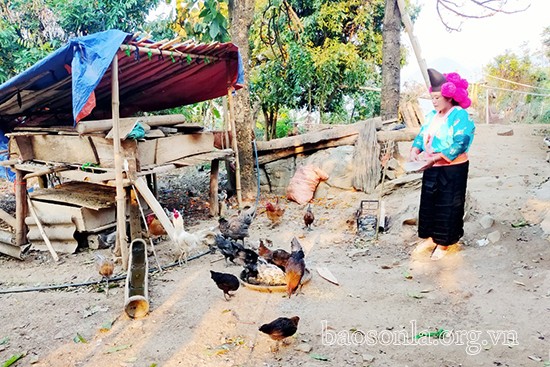(VOVWORLD) - In the mountainous commune of Pa Long in Son La province, many women of the Hmong ethnic group have succeeded in escaping poverty through farming and husbandry. Va Thi Kia is an example.
 Raising chickens gives Va Thi Kia a stable source of income. (Photo: baosonla.org.vn) Raising chickens gives Va Thi Kia a stable source of income. (Photo: baosonla.org.vn) |
From 2015 to 2019, with loans from the State, Va Thi Kia and other women in Tia village got involved raising black chickens.
At first, the model was unsuccessful, due to their lack of experience. Many chickens got diseases and died. Kia asked for husbandry training from the agriculture promotion staff and did a lot of research on her own.
Now Kia has successfully raised nearly 300 chickens, generating a stable income.
“Each hen should incubate 10 to 12 eggs per batch. After incubation, the chicks should be separated immediately from the hen. The chicks are fed with rice for 7 days. When the chickens weigh 500 grams, they’re fed with husks and maize,” said Kia.
Kia also raises fish and pigs, which gives her a stable income of around 4,300 USD per year. Kia frequently shares her husbandry experience with other local women.
“We gather into groups of 5 or 6 people and pool our money to invest in seedlings and breeding animals. Since 2019, with support from the district Women’s Union, we have contributed money to help poor local women build houses,” said Kia.
Kia also actively participates in many local movements, including a campaign called “the 3 Cleans: clean house, clean kitchen, and clean lane” and a campaign called “the 5 Withouts: without poverty, without law violations or social evils, without domestic violence, without giving birth to 3 or more children, and without having children who are malnourished or school drop-outs”.
Mr. Cha A Va, Chairman of Pa Long commune says 100% of Pa Long’s population are Hmong ethnic minority people and 60% still live in poverty. The successful husbandry model of Va Thi Kia, he says, should be replicated to help other people escape poverty.
“Va Thi Kia has shared her husbandry experience and techniques with other households. Our commune intends to help her replicate this model here,” he said.